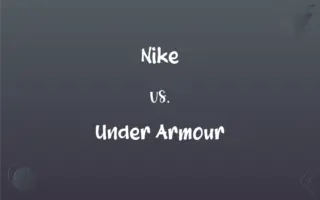Faraway vs. Far away: What's the Difference?
Edited by Aimie Carlson || By Harlon Moss || Published on February 13, 2024
"Faraway" is an adjective describing something distant in space or time, while "far away" is an adverb phrase indicating the extent of distance.

Key Differences
"Faraway" is used as an adjective, often evoking a sense of distance either physical or metaphorical. For example, "a faraway land" suggests a place that is distant or exotic. "Far away," however, functions as an adverbial phrase, describing the extent to which something is distant, as in "The stars are far away," indicating a great physical distance.
"Faraway" can carry a connotation of dreaminess or abstraction, not just physical distance. It is used in phrases like "faraway look," suggesting someone is lost in thought. In contrast, "far away" is more literal and is used to specify the physical distance of an object or person, like in "The mountain is far away from the village."
In literature, "faraway" often adds a romantic or mysterious quality to descriptions, as in "faraway places of adventure." It imbues the subject with an aura of mystique. Conversely, "far away" is straightforward and factual, lacking the poetic connotation, as seen in "He moved far away for work," simply stating a fact about distance.
"Faraway" is typically used to modify nouns directly, acting as an adjective, e.g., "faraway memories." It gives a sense of something being distant in time or space. "Far away" is used to modify verbs, showing the action happening over a distance, as in "She could hear the music playing far away."
"Faraway" adds a descriptive quality to nouns, often implying more than just physical distance. "Far away," as an adverbial phrase, is used to describe the extent or manner in which an action is performed, focusing more on the spatial aspect of distance.
ADVERTISEMENT
Comparison Chart
Part of Speech
Adjective
Adverb phrase
Function
Describes nouns
Describes verbs, adverbs, or adjectives
Connotation
Often poetic or romantic
Literal and straightforward
Usage in Sentences
"The faraway mountains are mesmerizing."
"He lives far away from the city."
Implication
Can imply emotional or temporal distance
Primarily indicates spatial distance
ADVERTISEMENT
Faraway and Far away Definitions
Faraway
Relating to a distant past.
Faraway memories surfaced in his mind.
Far away
At a great distance in space.
The village is far away from the city.
Faraway
Distant in space or time.
She gazed at the faraway hills.
Far away
Used to emphasize the idea of distance.
She could hear the sound coming from far away.
Faraway
Dreamy, lost in thought.
He had a faraway expression during the concert.
Far away
Used to describe the extent of separation.
His old home felt far away now.
Faraway
Pertaining to something remote or exotic.
Tales of faraway lands always fascinated her.
Far away
To a distant place.
They moved far away for a new beginning.
Faraway
Suggestive of something beyond reach.
Her aspirations seemed faraway and unreal.
Far away
Indicating a large gap in distance.
The stars seemed so far away at night.
Faraway
Very distant; remote.
FAQs
Is "faraway" one word or two?
It's one word, used as an adjective.
Is "far away" used as an adverb?
Yes, it's an adverb phrase.
Does "faraway" always imply physical distance?
No, it can also imply temporal or emotional distance.
Does "far away" have a romantic connotation?
Typically, no. It's more literal.
Can "far away" be used in place of "faraway"?
Not interchangeably; they have different grammatical functions.
Can "far away" start a sentence?
Yes, as in "Far away, a light shone."
Can "faraway" describe time?
Yes, as in "faraway times."
Can "far away" be used to describe sound?
Yes, like "sound coming from far away."
Does "faraway" only describe geographical distance?
No, it can be metaphorical as well.
Can "faraway" be used metaphorically?
Yes, like "faraway dreams."
Is "far away" more common in everyday speech?
Yes, due to its literal meaning.
Is "faraway" a formal term?
It's used in both formal and informal contexts.
Does "faraway" evoke imagination?
Often, with its suggestive connotations.
Can "far away" be hyphenated?
No, it's always two separate words.
Does "far away" work as an adjective?
No, it's an adverb phrase.
Is "far away" used in storytelling?
Yes, especially for setting scenes.
Is "faraway" commonly used in poetry?
Yes, for its poetic and romantic connotations.
Does "far away" imply a sense of longing?
Not inherently, it's more factual.
Can "faraway" describe feelings?
Yes, like "faraway longing."
Is "faraway" used in descriptive writing?
Yes, it's ideal for descriptive contexts.
About Author
Written by
Harlon MossHarlon is a seasoned quality moderator and accomplished content writer for Difference Wiki. An alumnus of the prestigious University of California, he earned his degree in Computer Science. Leveraging his academic background, Harlon brings a meticulous and informed perspective to his work, ensuring content accuracy and excellence.
Edited by
Aimie CarlsonAimie Carlson, holding a master's degree in English literature, is a fervent English language enthusiast. She lends her writing talents to Difference Wiki, a prominent website that specializes in comparisons, offering readers insightful analyses that both captivate and inform.






































































